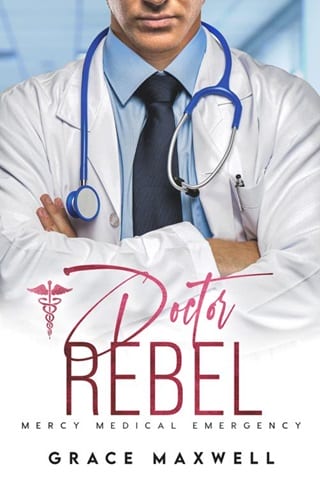Chapter 7
Chance
I stride into Dr. Charles Johns' office. I've been summoned, and it feels a lot like going to the principal's office. I hope this isn't about the drug trial. I still don't know enough to talk to him about that yet.
The head of medicine for Mercy Hospital sits behind his desk, a fortress of paperwork and digital screens around him, and he doesn't look up until I knock lightly on the open door.
"Dr. Johns," I begin, feeling the weight of the impending conversation.
"Dr. Devereaux," he greets curtly, fingers steepled in front of him. "I've heard rumors about our staff moonlighting at those safe-use clinics. That is in breach of their contracts. What do you know?"
I take a deep breath, readying my defense. "They're government clinics, and they're volunteering. It's not moonlighting if they're not getting paid."
"Volunteering," he repeats, the word heavy with skepticism. "It's a liability. What happens if someone dies and their family sues the hospital?"
"Safe-use clinics are saving lives," I push back. "They respond to overdoses immediately, prevent disease spread, and connect users to health services. We should be supporting this, not condemning it."
Dr. Johns' frown deepens. He shakes his head. "I can't condone it. They were hired to work here, not there."
I stand my ground, though I sense we're at an impasse. "Look, as long as it doesn't interfere with their responsibilities at the hospital, what's the harm? It's no different than if we come upon someone passed out on a sidewalk downtown. We stop. We help. That's what we do."
He leans back, the leather chair protesting under the shift of his weight. "That's different, and you know it."
"Is it?" I challenge. "Because I see it as an extension of our oath—to do no harm. Whether that's in the ED or as a volunteer in a clinic, it shouldn't matter."
Dr. Johns stares at me, his eyes narrowed. The silence stretches between us, thick and taut, before he dismisses me with a terse nod.
"This conversation isn't over."
I nod, acknowledging the temporary truce, and exit the office. The door shuts behind me with a soft click, sealing away the discord for now.
I stride back to the emergency department. There's no time to dwell on this. Duty calls, loudly and insistently. I'm greeted by three residents. They're clustered around the central desk like chicks waiting for their mother hen.
"Okay, team," I say, clapping my hands to capture their attention, "we've got a steady stream of lacerations today. Head over to the suture room and start stitching up."
They nod, collecting their gear before scurrying off, each one eager to prove their skills. It's a dance we perform daily, them seeking approval, me providing guidance. Turning away from the departing residents, my gaze lands on Mrs. Kim, her small form almost lost in the bustle of the department. She's standing outside my office, patiently waiting, and I can tell she's holding something in her hands. Her husband was in last week. He cut his finger off doing landscaping work. I approach her, mustering a smile despite my fatigue.
"Mrs. Kim," I say in greeting. "How is your husband today?"
She beams at me and nods vigorously. "Yes," she says, the word hanging between us, both question and answer.
"Annyeonghaseyo, eotteohge jinaeseyo?" I try again in Korean, aware of how my accent must butcher the beautiful cadence of her language.
Her reply comes in a flurry of rapid Korean. She speaks far too fast for me, but by her smile I infer her husband is improving. She offers up the casserole dish she's been cradling. It's fogged with warmth, and the aroma that wafts toward me is tantalizing. She tries to articulate her thoughts, the words stumbling from her lips, but the sentiment is clear— Thank you .
"Kamsahamnida," I respond, accepting the dish. She certainly owes me nothing, but to refuse would be an affront to her gratitude. I peek inside, and my mouth waters at the sight of what appears to be a perfectly prepared meal of Korean fried chicken. My stomach growls, reminding me I've skipped lunch.
"Thank you, Mrs. Kim," I repeat in English. She smiles once more, her eyes crinkling, then bows slightly and exits.
With the dish now in my possession, I momentarily consider taking a moment for the comfort of food.
Curiosity gleams in Jessica's eyes as she leans over the desk. "What did Mrs. Kim bring you, Dr. Devereaux? Are you going to share the love?"
"Looks like Korean fried chicken," I say, lifting the edge of the top to reveal the golden-brown pieces bathed in a lustrous red sauce, gochujang probably, its spicy aroma taunting our senses. "Sticky rice underneath."
"Ooh, that smells amazing," Tom Spaulding, one of our EMTs, chimes in, craning his neck for a better look. "You gonna share?"
Before I can answer, the radio cuts through the banter, the squawk urgent. "Incoming helo, ETA two minutes. Skier, compound fracture femur, severe blood loss."
"Damn," I mutter, resealing the casserole. There's no time to eat now. "Secure that ortho consult, stat," I call as I stash the dish in my office. Fried chicken will have to wait.
I'm already moving when a gurney rolls past. The skier, I presume. Dr. Ian McCormick, our emergency orthopod, is here and taking over. Perfect.
Next, I'm at the side of a 72-year-old female with a head injury from a fall. "Dr. Devereaux," I introduce myself.
She looks up at me with eyes clear and untroubled, an odd contrast to her situation. "Nice to meet you," she replies, her voice strong. "I'm Isla Farrow."
With my pen light, I check the responsiveness of her eyes and examine the hematoma on her forehead. It's a doozy. "What happened?"
"One minute, I was standing there, and the next, I was looking into the brightest blue eyes I ever saw. That ambulance driver, you know?"
"Sounds like quite the charmer," I muse. "How are you feeling now?"
"Much better, thank you."
But I'm not entirely convinced. "Good to hear, but we're going to run some tests, just to be sure everything's all right." I turn to my nurse, who is already prepping for the next steps. "CT, EKG, chest radiographs, urinalysis, basic labs, cardiac enzymes."
"Got it, Dr. Devereaux," the nurse confirms before darting off.
"Rest easy, Ms. Farrow," I tell her before pulling away to attend to the unending tide of need washing through the doors.
The wail of the ambulance siren fades into a rush of activity as EMTs burst in again.
"We've got a thirty-two-year-old woman," one of them announces.
I listen to her vitals and look her over. Her skin pallid and slick with sweat. The driver meets my eyes, his expression grim. "Blood pressure's through the roof, doc—two-thirty over one-sixty."
"Damn it." I'm already reaching for a syringe. "Get me beta blockers, now. We need to bring that down before she has a stroke or her aorta gives out. Three-point-five milligrams of Lopressor, stat," I bark, my focus narrowing to the woman's strained face.
A nurse nods, drawing the medication.
"Jessica," I call over my shoulder, "notify the OR to prep for transesophageal echo on the double."
"Got it, Dr. Devereaux," she responds.
I watch the woman's vitals, willing them to stabilize until she's whisked away.
As the tension in the room pivots to action, I spare a glance at the board—Ms. Farrow's name now sits neatly under the Admitted column. She's in good hands, beyond the immediate danger zone.
My shift's end looms, but there's one last task. I find my residents huddled around a lightbox, their faces lined with concentration and fatigue. Their sutures on today's patients are less than perfect, jagged lines that speak of their inexperience.
"Keep practicing," I tell them, slipping past to review their work. "Those stitches could be a lot cleaner. Remember, your knots are what stands between recovery and complication."
They nod, eyes earnest.
"Tomorrow, back here, on time."
"Will do, Dr. Devereaux," they chorus, and I sense their determination, their youth mingling with resolve. It's a cocktail of potential that keeps my blood pumping.
"Good." With that, I leave them to it and stride down the corridor, ready to shed the weight of the day.
I flick on the light in my office, and there it is—Mrs. Kim's dish. It sits patiently, a reminder of the humanity threaded through the relentless pace of hospital life. The savory aroma seems to wrap around me.
"Better take you home," I murmur to the casserole dish, as if it could hear me. And why not? After today, a bit of whimsy doesn't feel out of place. I scoop up the glassware and secure its cover, my mind already wandering to the flavors locked inside.
I carry it with me to the locker room and peel off the layers of my scrubs. In their place, I pull on the familiar comfort of jeans and a white T-shirt. Boots follow, anchoring me back to a world where I'm just Chance, not Dr. Devereaux.
Outside, the dish finds its place in the spacious compartment of my bike, nestled securely. As I pull out of the parking lot and head home, the bridge stretches before me, a steel ribbon against the twilight sky. I'm halfway across when Célineslips into my thoughts.
I remember the tarte de sucre I was given once at my hospital in Montreal. A gift from a patient, much like Mrs. Kim, who had nothing but gratitude to offer. Céline's nose had wrinkled at the sight of it, her voice laced with caution about unknown kitchens. I'd laughed it off, slicing through the pastry and letting the rich, sweet filling affirm my belief in simple acts of kindness. The flavor had been a revelation, a testament to the warmth found in handcrafted offerings. And now, with Mrs. Kim's dish resting behind me, I feel that familiar tug, a connection to something genuine.
The city falls away as I reach the other side of the bridge, the purr of the engine a solitary companion through the streets of North Vancouver. Pulling up to Ginny's house, I kill the engine and swing a leg over the bike. And there she is, Ginny, her wave as bright as any beacon. She walks outside, holding her sweater tight around herself.
"How was your day?" I ask .
"Every day above ground's a good day," she declares.
I can't help but grin. "Got a dish from a patient's wife," I tell her, extracting the casserole from my bike's saddlebag. "It's Korean chicken. I'm not sure how spicy it is but care to join me for dinner?"
She doesn't even blink, just nods with an eagerness that tells me she values company as much as the food. Dinner with Ginny—it's a plan that feels right, the easy camaraderie of shared loneliness.
"Let's find out together," she says, and I follow her inside.
I ease into one of Ginny's mismatched kitchen chairs, the casserole dish taking center stage on the table between us. Ginny busies herself with dishing out generous portions onto plates she's had since the seventies, floral patterns faded from years of use.
"Smells amazing, doesn't it?" I comment.
"It sure does," she agrees, settling across from me. "Walter would have loved this. He was always trying new foods."
The mention of her husband brings a softness to her eyes, and I lean in. "Tell me about Walter," I say.
She smiles, a touch of wistfulness coloring her tone. "He had a busy dental practice. Our son was in Toronto at university. He passed away quietly one night, right here in this house. It was peaceful, almost as if he was just slipping into another room." Her voice trembles ever so slightly, but there's a peace in her acceptance of the past.
I nod, understanding the sacredness of such moments, though I've only seen them through the lens of my profession. "Sounds like he went the way most folks hope to go," I reply.
"Yes," she says, her gaze drifting toward the window. "He left me with good memories and this old house full of echoes. That's why I appreciate having you around. You living in the rental unit makes me feel safe again."
Her admission tugs at something inside me, a reminder that what we do for others often carries weight beyond our intentions. I reach across the table, covering her hand with mine for an instant. "I'm glad I can offer you that sense of security, Ginny."
We share a look, an unspoken understanding that companionship and security are precious commodities in our unpredictable lives. Then we turn our attention to our meal, diving into the spicy flavors Mrs. Kim has so skillfully prepared.
I'm scraping the last bits of sticky rice onto my fork when Ginny leans back in her chair, eyeing me with a thoughtful tilt of her head. "Chance," she says. "When you rented the apartment, I thought there were going to be two of you. What happened?"
The question hangs in the air, mingling with the savory scent of Korean spices. I set down my fork and meet her gaze. "My girlfriend, Céline, decided at the last minute not to come with me to Vancouver."
Ginny frowns. "You must not have been in love, then. If you loved her, wouldn't you have stayed?"
I shake my head, feeling the weight of the decision that brought me here. "I had already committed to the job at Mercy Hospital," I tell her. "I've never been one to renege on a commitment."
"Then why didn't you propose?" she prods, her hands folded neatly on the tabletop. "No girl in her right mind would move across the country without a commitment."
"Most folks from Quebec, around my age… They see marriage more as a religious institution. We're not religious," I tell her, trying to convey the cultural nuance.
Her brows knit together. "But can't you see it as a commitment to another person, not just a religious act?"
I shrug, an easy motion that doesn't quite match the complexity of emotions behind it. "You don't need a piece of paper for commitment."
Ginny opens her mouth, then closes it, wordless for a moment. In that silence, I feel the gap between our perspectives, wide and untraversable.
Dinner wraps up with a quiet that wasn't there before. I help clear the dishes and bid her goodnight.
Back in my own space, I peel off the day's weariness along with my clothes, trading them for the comfort of a well-worn T-shirt and boxers. As I lie in bed, the ceiling fan casting fleeting shadows across the room, Ginny's words replay in my mind. Céline never wanted marriage; we were united in that. But if there had been a silent vow between us, a promise without ceremonies or signatures, would it have anchored me to Montreal? Would she have come with me as she promised? Or was the pull of my commitments—my word, my career—stronger than the bonds of an unspoken pact?
I turn over, the sheets cool against my skin, and close my eyes. Sleep will come eventually, but first, it demands that I sift through the what-ifs and might-have-beens all over again.
 Fullepub
Fullepub 



